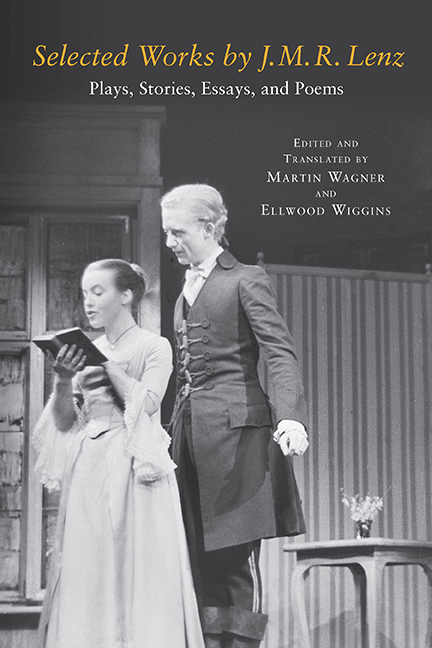Introduction
Published online by Cambridge University Press: 27 March 2020
Summary
IN A SHORT DIARY ENTRY FROM AUGUST 21, 1912, Franz Kafka wrote: “Read Lenz incessantly and—such is my state—he restored me to my senses.” In the index to the English translation of Kafka's diaries, the editors explain the irony of this statement in all brevity: “Lenz, Jacob Michael Reinhold (1751–92), German poet, who went insane.” This short entry reads like a caricature of Lenz's popular image. The persona J. M. R. Lenz is indeed indelibly linked to the myth of his early mental breakdown, famously depicted in one of German literature's most influential texts, Georg Büchner's novella Lenz (published posthumously in 1839). Kafka must have been in a sorry state indeed—or so one may understand his note—if reading Lenz brought him back to his senses.
And yet one should hope that Kafka did not simply swallow this stereotype hook, line, and sinker, reiterating what has been said about Lenz ever since Goethe dismissed his onetime friend as a “whimsical” fellow of questionable sanity, who wasted his time on half-baked plans and intrigues. In fact, Lenz's literary and theoretical works—many of them published before he turned twenty-four—contain astonishingly learned and thought-provoking reflections on the literary, theological, economic, and military discourses of his time. Combining his wide reading with an acute observation of the world he lived in, Lenz importantly contributed to the self-critique of the Enlightenment known in literary history as Sturm und Drang (Storm and Stress)—a movement that comprised some of Germany's most well-known writers, including Johann Wolfgang von Goethe (1749–1832) and the theologian and philosopher Johann Gottfried Herder (1744–1803), and that is sometimes described as a precursor to both Romanticism and literary realism. Lenz's work, moreover, was instrumental in moving German literature away from rulebound neoclassical Enlightenment poetics and in setting the stage for a new and critical reflection of social and political reality in a less rigidly bound literary form.
With his new reflection on the relation between literature and reality— and the literary form of reality—Lenz had a major impact not so much on his contemporaries (who soon forgot him), as on later generations of German writers.
- Type
- Chapter
- Information
- Selected Works by J. M. R. LenzPlays, Stories, Essays, and Poems, pp. 1 - 22Publisher: Boydell & BrewerPrint publication year: 2019



